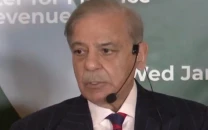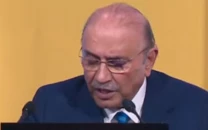Afghan Taliban remain 'very supportive' of TTP: report
Analysis states Pakistan’s response to TTP resurgence remained 'incoherent', unlikely to improve in near term

The Afghan Taliban appear unlikely to shift their strategic calculus on providing support to the Tehreek-e-Taliban Pakistan (TTP), an analysis by the United States Institute for Peace (USIP) stated on Thursday.
It furthered that much of the TTP’s political leadership and capability was based in Afghanistan and the outlawed faction was able to fundraise through extortion inside Pakistan as well as in Afghanistan.
It reiterated that the Afghan Taliban remain “very supportive” of the TTP and are providing the group with a permissive safe haven.
“The TTP also has a lot of popular support in Afghanistan, where both Taliban and non-Taliban constituencies get behind the TTP due to a fervent dislike for Pakistan. Some Taliban fighters are also joining the TTP, and there are reports of some recent bombers being Afghan”.
Read Afghan Taliban show willingness to address TTP issue
The commentary countered that some Afghan Taliban leaders, particularly Afghan Interior Minister Siraj Haqqani, restrained the outlawed group on Pakistani requests on occasion.
“Yet the balance of opinion within the Taliban is strongly in favour of the TTP and its campaign. In particular, Taliban Amir Hibatullah Akhundzada agrees with the TTP that the Pakistani system is “un-Islamic””.
It continued that in the weeks prior and days after the attack on a Peshawar Police Lines mosque, the Afghan Taliban’s public messaging was “almost defiant, offering the weakest of condemnations and painting Pakistan as ultimately responsible for militancy within its borders”.
The report maintained that the “undiplomatic rhetoric” underscored the Taliban’s determination to continue supporting the TTP, despite intensified pressure from Pakistan.
It alleged that “interlocutors with access to Kandahar report that the emir and his close advisors are unlikely to waiver in supporting the TTP on ideological grounds”.
“However, in spite of the Taliban’s firm strategic calculus in favour of the TTP, their leadership appears to understand the importance of maintaining a functional relationship with Pakistan. The Taliban’s posture moving forward will likely appear like a tug-of-war, alternating between moments of tension and de-escalation”.
How will Pakistan respond?
According to the report, Pakistan’s response to the TTP resurgence remained “incoherent” and was unlikely to improve in the near term.
“After downplaying the TTP’s strength as well as the Taliban’s influence on and relationship with TTP for several years, Pakistani leaders now seem to be contending with the depth of Taliban support for the TTP”.
It stated that Islamabad continued to search for a deal through the Taliban and that the military and intelligence leadership, as well as the foreign ministry, appeared to want to work with the Taliban, viewing it as more favourable than the former republic government.
Read More Islamabad asks Kabul for ‘concrete actions’ against TTP
t added that the Afghan Taliban’s “uncompromising commitment” to the TTP meant that Pakistan had to either “ignore the violence or concede to the TTP to maintain a relationship with the Taliban”.
“Another key factor shaping the Pakistani response is the country’s deteriorating economy, which is on the brink of a default”. It furthered that the economy limited Islamabad’s military options as the army could carry out raids and undertake defensive actions inside the country but didn’t possess the resources for a sustained high-intensity campaign.
TTP, the US and Pakistan
According to the analysis, in 2023, the TTP does not pose such a direct threat to the United States, at least in the near term.
“In contrast to the past, TTP messaging makes the point that it has no direct aims against the United States. In general, the group appears more focused on its local agenda against Pakistan”.
It detailed that one of the main reasons for the shift is the current leader of the TTP, Mufti Noor Wali Mehsud because, in Mehsud’s diagnosis of the decline of the TTP from 2011 to 2017, the biggest setback for the group was its targeting by US drone strikes.
“Mehsud is deterred from taking on the United States by the fear of drone strikes. So, he is steering clear of provocations and plotting against the United States, in the hope of not triggering another campaign of drone strikes against his group”.
Also Read Unpacking TTP’s curious new narrative
It added that given the current economic and political crisis in Pakistan, US policymakers “may be well placed to have conversations with Pakistani leaders about the need to focus and develop a clear counter-TTP plan”.
“However, Washington’s ability to shape or assist on such a plan will be limited”.
It questioned how Pakistan will handle the Afghan Taliban who provides safe haven to the TTP.
“It is unlikely that the Pakistanis will heed any US suggestions to pressure the Afghan Taliban in Kabul (let alone break ties)”.
It continued that if Pakistan took action within Afghanistan and against the Afghan Taliban, it would be because of decisive moves emanating from Islamabad, and not at the behest of Washington.



















COMMENTS
Comments are moderated and generally will be posted if they are on-topic and not abusive.
For more information, please see our Comments FAQ